The 20th Tokyo-Beijing Forum was officially opened on December 3, 2024, with the discussions beginning the following day on December 4 at The Prince Park Hotel in Tokyo's Shiba Park. The event was co-organized by The Genron NPO and China International Communication Group.
Due to the COVID-19 pandemic, it was the first time in six years that the forum had been held in person in Tokyo, and on December 4-5, attendees engaged in discussion around the primary theme: "Restoring peace and rebuilding a global order based on multilateral cooperation through Japan-China cooperation."
The opening ceremony was held on the morning of December 4, and was presided over by Yasushi Kudo, President of The Genron NPO.
Japan and China have responsibility to international community to engage in close dialogue and gain greater mutual understanding
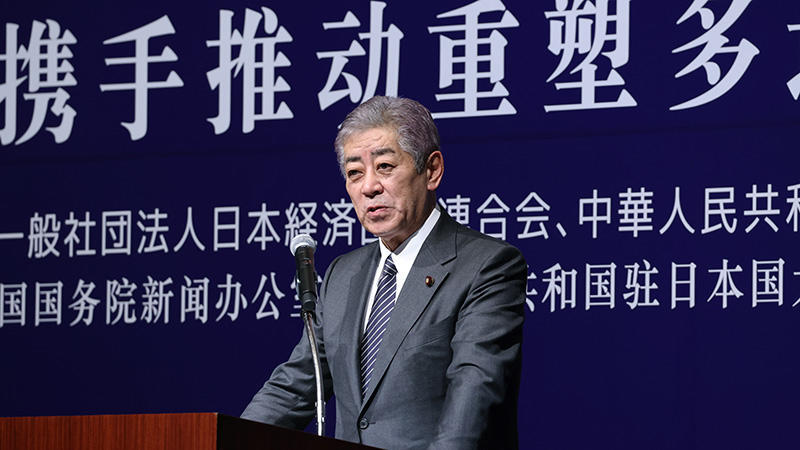
Minister of Foreign Affairs Takeshi Iwaya represented the government of Japan as the first to take the podium, and he began by expressing gratitude for what the Genron NPO platform has managed to achieve over the last twenty years. Iwaya addressed the fact that Japan and China have both worked hard to build a better relationship even in the face of various issues, pointing out, "Both countries have a great responsibility to the region and to the world. Building a more constructive and stable relationship between Japan and China is the hope of many people, and of many countries."
Iwaya then spoke about a telephone conversation he had in October with his counterpart in China, Wang Yi, who in addition to his role as Minister of Foreign Affairs, also serves as Director of the Chinese Communist Party Central Committee Foreign Affairs Commission Office.
"We confirmed our shared desire to use our positions as foreign affairs ministers to communicate more effectively, and build a better relationship that both of our peoples will appreciate as beneficial," he said.
Iwaya emphasized that both countries are working to strengthen communication at all levels of government and in various other areas, noting that at the recent summit meeting held between Japanese Prime Minister Shigeru Ishiba, Chinese Premier Li Qiang, and Chinese President Xi Jinping, the politicians re-affirmed their mutual intention to comprehensively promote a mutually-beneficial strategic relationship that is both stable and constructive.
Iwaya welcomed the recent announcement that exemptions for short-term visas for Japanese citizens have been resumed, and mentioned that he was planning on visiting China himself soon, saying, "Bit by bit, the news about the Japan-China relationship is becoming more and more positive, and the relationship between the two countries has again begun to move forward."
He added that he looks forward to engaging in dialogue with Foreign Minister Wang Yi aimed at resolving any outstanding issues, and at ways in which the two countries can expand cooperation.
Iwaya also spoke about strengthening global governance, particularly in regard to helping UN Security Council better function in response to the increasingly complex situations surrounding the Ukraine War and the Middle East, and expressed his high expectations for the success and continued growth of the Tokyo-Beijing Forum.
"It is important for Japan and China to fulfil their responsibilities to the international community by engaging in careful dialogue," Iwaya said. "It now feels even more important to improve mutual understanding considering the results of the Japan-China Joint Public Opinion Survey. I look forward to this opportunity for a frank exchange of views, and I hope that our discussions today lead to fruitful results."
China has an important partner in Japan; need to implement the shared consensus that neither is a threat to the other
China's Minister of Foreign Affairs Wang Yi provided a video message offering greetings from the government of China. Wang opened by praising the Tokyo-Beijing Forum for its work in improving China-Japan relations, saying, "It has played a major role. It has helped the two countries maintain the principles under which the relationship was normalized, particularly in times of adversity, has strengthened our faith in friendship, and has tenaciously worked to promote mutual understanding between our peoples."
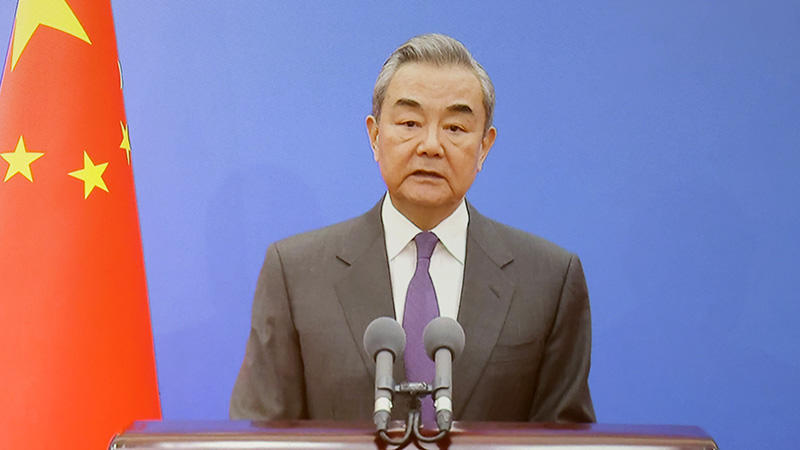
"It is important for the peace and development of the region and the world for the relationship between China and Japan to move in the right direction," Wang continued, describing the two countries as being important to both Asia and the world.
He continued by noting that at the November meeting, the governments of the two countries re-confirmed their agreement with the "four political documents," the communiques and other diplomatic documents that were published during efforts to re-normalize relations between the two countries (i.e. the joint communiqués of 1972 and 2008, the peace treaty of 1978, and the joint declaration of 1998.) Also at this most recent meeting, the leaders of both counties agreed to comprehensively promote a mutually-beneficial strategic relationship, and to build a constructive and stable bilateral relationship that meets the demands of today.
He called for the two countries to recognize this consensus between the leaders as a guide for future action in finding the proper path to mutual understanding, and to promote long-term stable development of the relationship between China and Japan.
"China has always regarded Japan as an important cooperative partner, and hopes that Japan can view China's development objectively and rationally. I hope that Japan will work with China to follow the correct positioning of comprehensively promoting the strategic relationship of mutual benefit, and implement the important consensus that the two countries should be 'cooperative partners rather than each other's threats'," Wang said.
He mentioned that Iwaya will be warmly welcomed when he is able to visit China, adding that he would also like to visit Japan when the time is right, in order to work together on implementing the shared consensus of their leaders, and to promote the development of the bilateral relationship. He then returned to his earlier point about the "four political documents."
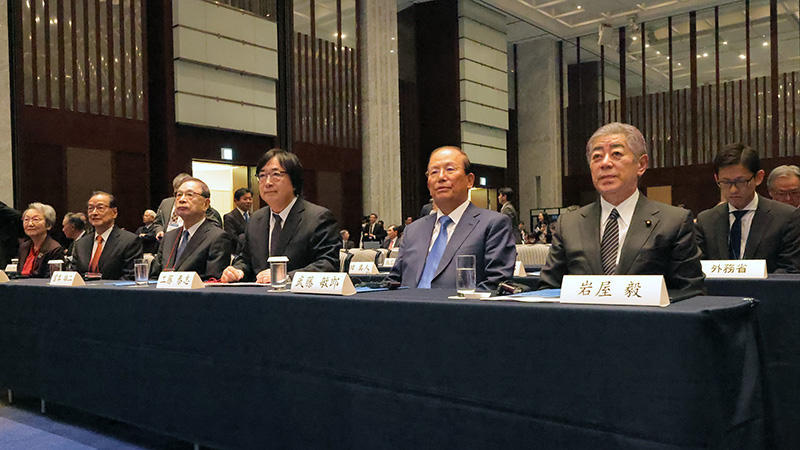
"The four political documents between China and Japan have laid the political and legal foundations for bilateral relations, and they should not be blurred or reversed, even less undermined. Historical, Taiwan-related, and other major sensitive issues bear on the bottom line and conscience of bilateral exchanges and cooperation. Only by honoring commitments can the political foundation of China-Japan relations be unbreakable," he said, before turning to the upcoming anniversary of the end of World War II.
"Next year will mark the 80th anniversary of the victory of the Chinese People's War of Resistance against Japanese Aggression and the World Anti-Fascist War," he explained. "Japan is once again faced with the question of history, morality, and the times. Wang Yi expressed the hope and belief that visionary people in Japan can draw lessons and inspirations from the mistakes they have made in the past, demonstrate once again their determination to uphold peaceful development and rediscover the correct way to coexist with its neighbors."
Finally, Wang spoke about the theme of this year's Tokyo-Beijing Forum, "Restoring peace and rebuilding a global order based on multilateral cooperation through Japan-China cooperation."
"It is obviously the responsibility of both our countries. In the face of rising unilateralism and protectionism, China and Japan should work in tandem to safeguard Asian unity and cooperation and prevent external forces from fomenting confrontation," he said.
Keeping the US in mind while it works to deepen its conflict with China, Wang called on China and Japan to advocate for and practice "true multilateralism and open regionalism to inject impetus into global peace, stability, development and prosperity."
He ended his comments by expressing his hopes that the Beijing-Tokyo Forum will continue to promote candid exchange, build consensus, provide suggestions for and make new contribution to the development of China-Japan relations "fit for a new era."
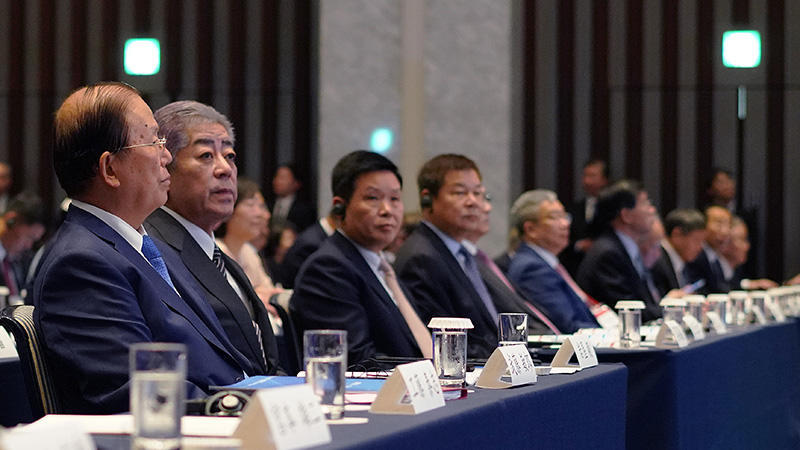
Resolving the crisis between Japan and China requires leaders to see the big picture and younger generations to join the dialogue
The keynote speeches were given by former Japanese Prime Minister Yasuo Fukuda, Chief Advisor to the Tokyo-Beijing Forum. Due to circumstances, his speech was read by Yuji Miyamoto, Vice Chairman of the forum's Executive Committee, former Ambassador to China, and Director of the Miyamoto Institute of Asian Research. Providing the keynote speech for the Chinese participants was Mo Gaoyi, Director of the State Council Information Office.
Fukuda's speech opened with praise for the forum.
"As the saying goes, 'persistence is power,' and over the last twenty years, the Tokyo-Beijing Forum has developed into a valuable high-level dialogue between the private sectors of Japan and China, and it has come to be recognized as such. I believe that this is due to the strong relationship of trust that the participants have built with each other. What this shows is that the Japan-China relationship is very important, and it has been built on the shared belief that it must be both constructive and cooperative."
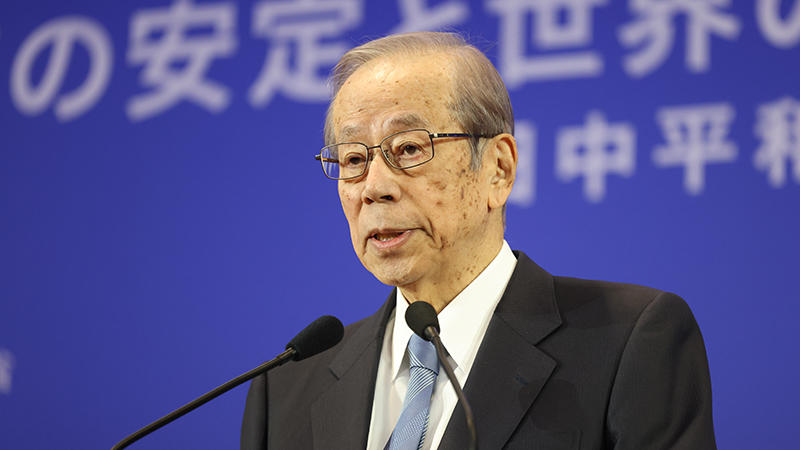
Fukuda's speech then turned to the international situation of the past two decades.
"The biggest change has been the rise of China. It has become a global superpower, and its every word and action have an immense impact on the world, but neither Japan nor China seem to have adapted very well to this new reality...and with the rise of China, now the entire world is being asked how to achieve our shared goals of global peace and growth."
Fukuda's speech referred to the "xenophobic, unilateral, and protectionist tendencies" of the recently re-elected Donald Trump, arguing that, "There has never been a greater need for an international effort to reduce global conflict and tension, avoid division, and build a peaceful world of cooperation and collaboration."
Fukuda "wholeheartedly welcomes" President Xi Jinping's intention to uphold international norms based on the fundamental ideas and principles of the UN Charter, which was clarified in a statement made at the G20 Summit in November. He also praised Xi for reaffirming the shared goal of comprehensively promoting the mutually-beneficial strategic relationship during his meeting with Prime Minister Ishiba.
However, Fukuda also expressed some concern that Japan and China are facing a crisis of "dialogue, mutual understanding, and trust" and stated that government leaders need to see the "big-picture" when making decisions. Fukuda also believes that direct exchanges between the peoples of Japan and China are even more important, adding that "It is particularly important for younger generations to interact."
Fukuda hopes that upcoming meetings between the leaders of the two countries will result in agreement to improve youth exchanges, and said that the discussions held at the Tokyo-Beijing Forum will be key to achieving that.
Japan and China are partners not mutual threats, and it is important to reflect that political consensus in actions
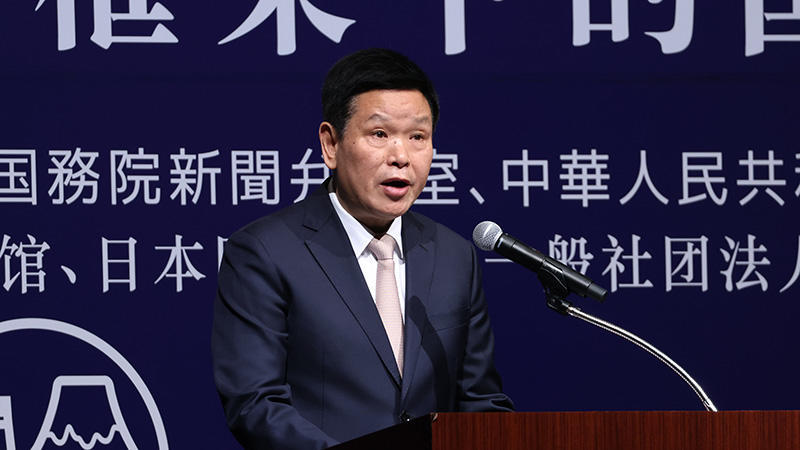
Mo Gaoyi took the stage for his keynote speech, which he began by speaking highly about the Tokyo-Beijing Forum celebrating its 20th anniversary, and about it having played a major role in helping promote friendship between China and Japan. He also expressed his appreciation for the effort put in by the participants from various fields.
He touched upon the increasingly chaotic regional and international situations when he said, "I hope that both sides will earnestly implement the consensus reached by the leaders, enhance interactions at all levels, strengthen mutual trust, deepen cooperation, and work together to ensure the steady and long-term progress of China-Japan relations."
Mo referred to an ancient Chinese proverb that says "A near neighbor is better than a distant cousin" when he pointed out that China and Japan are separated merely by a strip of water, have deep cultural ties, and have a long history of both cultural interaction and their peoples helping each other. He then explained how "Chinese-style modernization" has adapted to the times and praised its successes.
"The Chinese-style driving force is based upon reform, opening up, and innovation, and it offers an excellent opportunity for Japan as well," he said. "This reform has been led by our party and our people, and it has built something new and great that has caught the eyes of the world."
Mo argued that because of China's growth and its peaceful policy of "reform and opening up," it can learn much from Japan's modernization, during which the country gained much valuable experience in implementing industrial policies, in corporate technological innovation, education reform, and in building a social security system.
Regarding the state of China-Japan relations, he described China and Japan as important countries in Asia, adding, "We must maintain our strategic autonomy while maintaining friendly relationships with our neighbors, and actual policies must reflect the political consensus that the two countries should be cooperative partners who pose no threat to each other. We need to put more effort into maintaining peace and stability in the region by injecting new energy into exchanges and collaborations in various fields."
Mo also recognized that the mass media has an essential role to play in developing a friendly relationship between the countries and to promote more exchange, and emphasized the shared cultural concept of harmony.
"We are all well aware of the saying, 'Cherish the harmony among people,'" Mo said. "I hope that both of our countries will work to increase the interaction among our peoples through youth exchanges, think tanks, regional exchanges, and various other way, and that we use next year's Expo 2025 in Osaka to promote such opportunities."
Basing the next decade of dialogue on setting aside minor differences for the common good
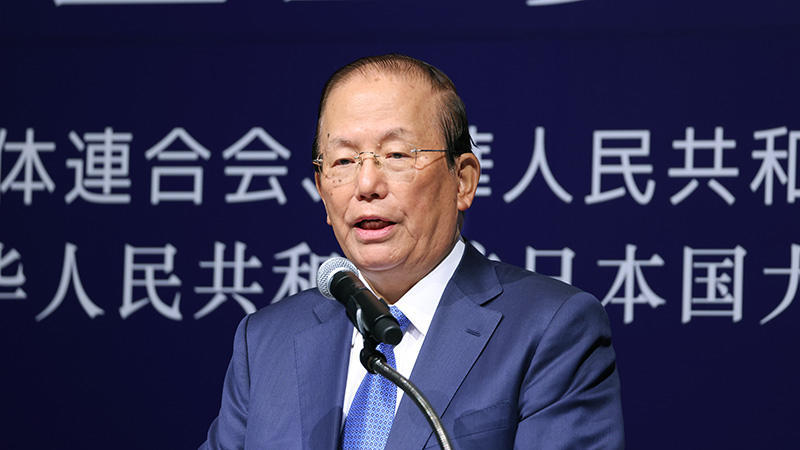
Upon the conclusion of the keynote speeches, the welcoming address from the Japanese organizers was given by Toshiro Muto, Chairman of the forum's Japanese Executive Committee, former Deputy Governor of the Bank of Japan, and Secretary General of the Tokyo 2020 Olympic and Paralympic Games Organizing Committee. Muto began by speaking about the first forum held in Beijing in 2005.
"The Japan-China relationship has been difficult at times, with its ups and downs over the years, but it is unarguable that we have been able to continue to engage in dialogue without a single break due to the trust we have in each other," he said.
Muto also expressed his hopes that the eight subcommittees scheduled to meet during the Tokyo-Beijing Forum would result in "fruitful dialogue between the high-level experts from Japan and China."
Muto referred to the degradation of public sentiment shown in the most recent Japan-China joint public opinion poll when he said, "It is an unfortunate reality for those of us at this forum who have continued to engage in dialogue. We must discuss these changes with humility and authenticity, and never give up on the effort to deepen our mutual understanding."
Finally, Muto talked about the agreement to continue the dialogue for another ten years.
"We all understand just how extremely important this forum is to both improving and growing the relationship between Japan and China," he said, calling on those in attendance to engage in even more effective dialogue over the next decade. As the largest forum for private sector dialogue between Japan and China, Muto explained that all must be willing to "set aside small differences for the common good," and he repeated his intention to continue "working to promote mutual understanding between the peoples of our two countries."
Working hard to development China-Japan relations over the next decade, and contributing to global peace and prosperity
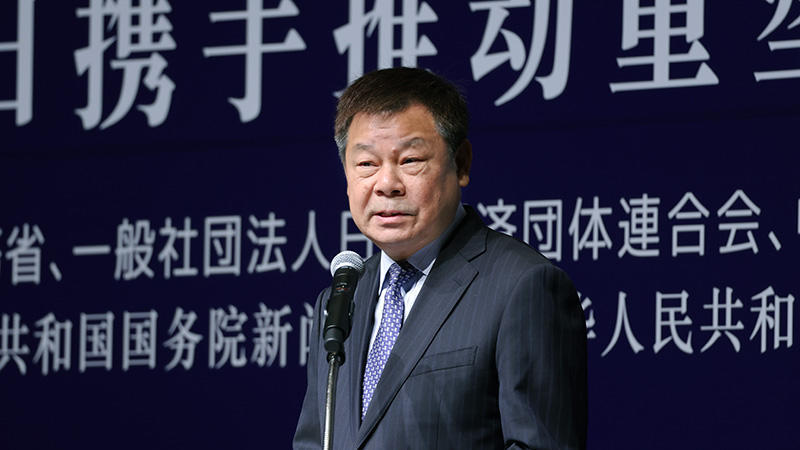
The welcoming address from the Chinese organizers was provided by Du Zhanyuan, President of China International Communications Group.
"When someone comes of age at twenty years old, we call them ruòguàn in China, while in Japan, they are called seijin," he said. "(The Beijing-Tokyo Forum) has now reached that milestone."
Du praised the forum for opening the doors to friendship in the difficult relationship between China and Japan, and for its continued mission to increase private-sector exchanges and deepen the friendship between the two countries. He noted that the content and format of the forum have improved over the years, describing how it is gathering attention in both China and Japan as one of the most influential private-sector diplomacy platforms right now, and stressed the importance of building friendly, cooperative, and trusting relationships that are cross-generational.
Du proposed three ideas for the coming decade of dialogue. First, the agendas should adapt to the times and should reach for new strategic heights. Second, they should promote innovation and creativity, bring together diverse strengths, and improve cooperation. Third, younger people should be brought into the dialogue and into exchanges to ensure a better future.
"As we enter a new age, let us work hard to promote a stable, sustainable relationship between China and Japan, and contribute greatly to global peace and prosperity," Du concluded.
Agreeing to a new dialogue for the next decade, not simply an extension of the past
After the opening ceremony, attendees gathered to sign the agreement to extend the dialogue for another ten years beyond 2024. This was officiated by Yuho Nishimura, Director of the International Department at The Genron NPO.
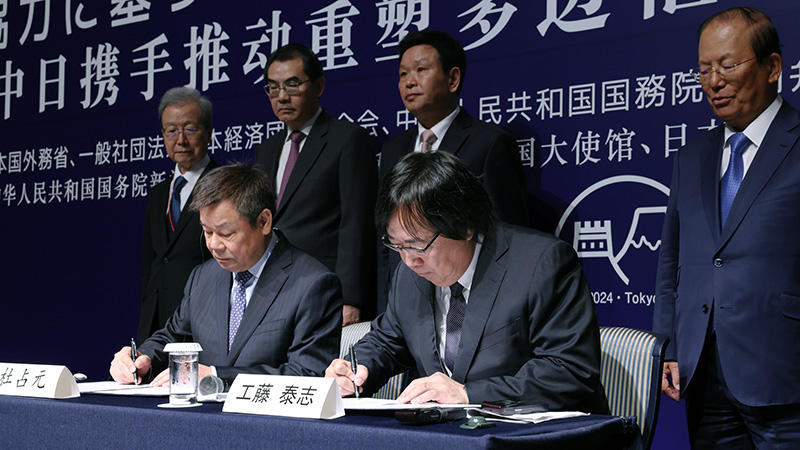
The agreement was signed by Yasushi Kudo, President of The Genron NPO and Du Zhanyuan, President of China International Communication Group, with three individuals from each country witnessing (Toshiro Muto, Yuji Miyamoto, and former Bank of Japan Deputy Governor Hirohide Yamaguchi; and Mo Gaoyi, former Chinese Ambassador to Japan Cheng Yonghua, and current Ambassador Wu Jianghao.)
Du and Kudo shook hands to applause from the venue, with Du calling the event a "celebration of a brand-new decade," and Kudo vowing to "hold new dialogues that are not mere extensions of the past."
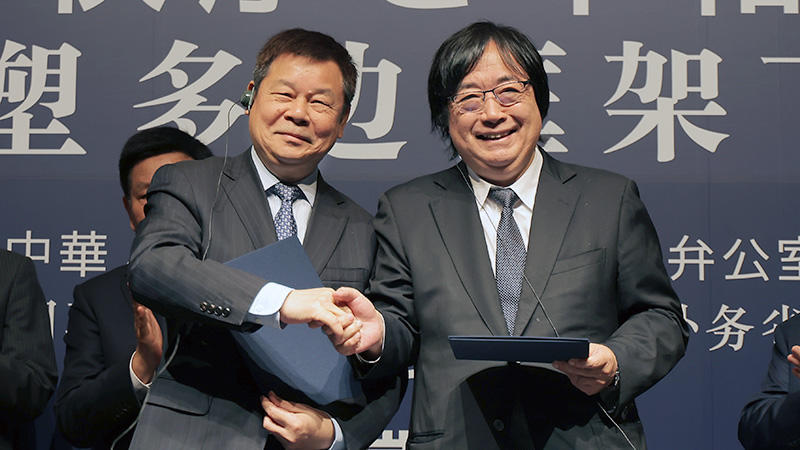
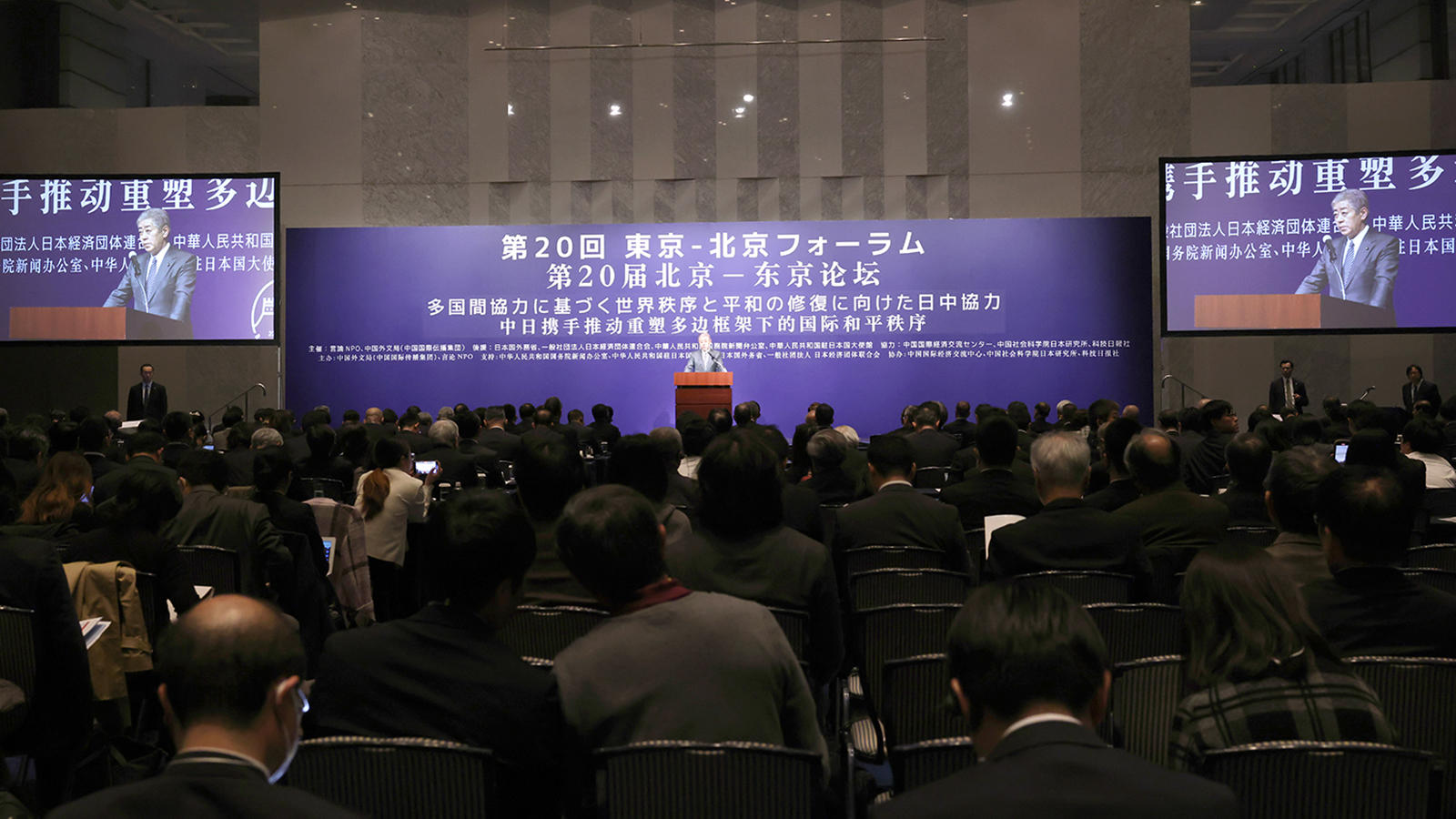
Post a comment